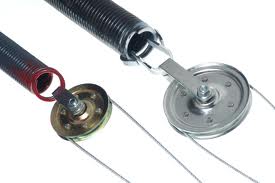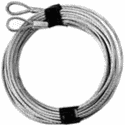Garage Door Cables
If the garage door cable becomes worn and snaps then there is a high chance that the door will fail to open or close and could possibly even let the garage door fall with no drive control. Fortunately the springs on the door header are there to prevent any serious injury or damage in the event a problem does occur.
Most Garage door cables come in a variety of lengths, diameters and styles. Every garage door cable is designed for use on a specific size, weight and type of garage door. Cables attach to the bottom brackets of Garage doors and are under an extreme amount of tension. Cables raise the garage door in the air through a spring system through the use of pulleys and drums. Garage door cables must be at least 18 inches longer than the height of the door opening. For special applications with high lift or full vertical lift track, longer cables are necessary.
Garage Door Cable Diameter
The most common diameters of cables are 3/32″, 1/8″, 5/32″, 3/16″, and 1/4″. Since most Garage Doors weigh 500 lbs or less, standard 1/8″ cables are widely used. For commercial size Garage Doors 5/32″ and 3/16″ are popular. Any garage door over 14 ft in height should use a minimum of 5/32″ diameter cable. Using cables rated less than the weight of door will cause the cables to snap, resulting in damage to the door. In order to prevent the cable from slipping off the drums, cable stops are used. Stops are made of either aluminum or copper and are sized based on the diameter of cable itself. It is crucial that the cable diameter and stop size are equal to prevent slipping. Stops are crimped onto the cable so they are securely fastened. Since extension spring door applications don’t use drums, extension cables do not require stops.
Sleeves
Cables are attached to the bottom brackets of a garage door. Each bottom bracket has a round fixture on the outside where the cable loops are attached. Sleeves allow the cable loops to stay intact. It is important that sleeves be soddered or crimped correctly to prevent slippage. Cables most often break near the sleeve end.
Thimbles
In order to protect garage door cable loops from wearing out, thimbles are inserted. These thimbles are inserted inside the loops protecting metal on metal wear and tear. Thimbles are especially important on heavy doors, and because residential doors are not as heavy, they are not used as frequently as in commercial facilities.
Spools
Like thimbles, cable spools help protect the cable from wear and tear. As the door travels in either direction, the cable loops will rub against the bottom brackets. Spools are cylindrical while thimbles are oblong in shape. Both serve their purpose in protecting cables from breakdown in the loops.
Don't hesitate, and give us a call at (214) 310-1806 with all your garage door needs!

